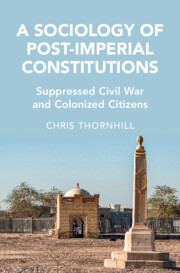Book contents
- A Sociology of Post-Imperial Constitutions
- Cambridge Studies in Law and Society
- A Sociology of Post-Imperial Constitutions
- Copyright page
- Dedication
- Contents
- Acknowledgements
- Introduction
- Chapter One Imperialism and the Origins of Constitutions
- Chapter Two Constitutions and the Persistence of Empires
- Chapter Three Imperialism and Global Civil War
- Chapter Four Imperial Nations in Latin America
- Chapter Five Military Constitutions in and after the Ottoman Empire
- Chapter Six World Law and Occupation Constitutions
- Chapter Seven The Occupation Constitution II
- Chapter Eight The Occupation Constitution III
- Chapter Nine Constitutions after War
- Chapter Ten New Security Constitutions
- Conclusion
- Bibliography
- Index
- Cambridge Studies in Law and Society
- References
Bibliography
Published online by Cambridge University Press: 06 December 2024
- A Sociology of Post-Imperial Constitutions
- Cambridge Studies in Law and Society
- A Sociology of Post-Imperial Constitutions
- Copyright page
- Dedication
- Contents
- Acknowledgements
- Introduction
- Chapter One Imperialism and the Origins of Constitutions
- Chapter Two Constitutions and the Persistence of Empires
- Chapter Three Imperialism and Global Civil War
- Chapter Four Imperial Nations in Latin America
- Chapter Five Military Constitutions in and after the Ottoman Empire
- Chapter Six World Law and Occupation Constitutions
- Chapter Seven The Occupation Constitution II
- Chapter Eight The Occupation Constitution III
- Chapter Nine Constitutions after War
- Chapter Ten New Security Constitutions
- Conclusion
- Bibliography
- Index
- Cambridge Studies in Law and Society
- References
- Type
- Chapter
- Information
- A Sociology of Post-Imperial ConstitutionsSuppressed Civil War and Colonized Citizens, pp. 507 - 550Publisher: Cambridge University PressPrint publication year: 2024

